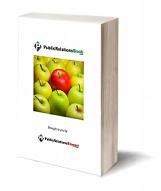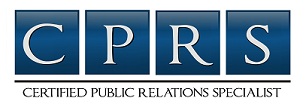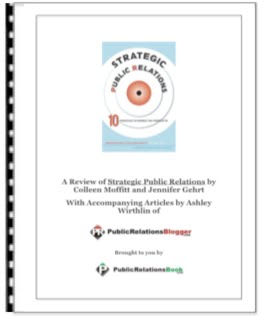________________________________________________________________________
Below are some tactics and methods used in Public Relations.
A fundamental technique used in public relations is to identify the target audience, and to tailor every message to appeal to that audience. It can be a general, nationwide or worldwide audience, but it is more often a segment of a population. Marketers often refer to economy-driven "demographics," such as "black males 18-49," but in public relations an audience is more fluid, being whoever someone wants to reach. For example, recent political audiences include "soccer moms" and "NASCAR dads." There is also a psychographic grouping based on fitness level, eating preferences, "adrenaline junkies,"etc...
In addition to audiences, there are usually stakeholders, literally people who have a "stake" in a given issue. All audiences are stakeholders (or presumptive stakeholders), but not all stakeholders are audiences. For example, a charity commissions a PR agency to create an advertising campaign to raise money to find a cure for a disease. The charity and the people with the disease are stakeholders, but the audience is anyone who is likely to donate money.
Sometimes the interests of differing audiences and stakeholders common to a PR effort necessitate the creation of several distinct but still complementary messages. This is not always easy to do, and sometimes - especially in politics - a spokesperson or client says something to one audience that angers another audience or group of stakeholders.
Lobby groups
Lobby groups are established to influence government policy, corporate policy, or public opinion. An example of this is the American Israel Public Affairs Committee, AIPAC, which influences American foreign policy. Such groups claim to represent a particular interest and in fact are dedicated to doing so. When a lobby group hides its true purpose and support base it is known as a front group. Moreover, governments may also lobby public relations firms in order to sway public opinion. A well illustrated example of this is the way civil war in Yugoslavia was portrayed. Governments of newly succeeded republics of Croatia and Bosnia invested heavily with American PR firms, so that the PR firms would give them a positive war image in the US.
Spin
In public relations, "spin" is sometimes a pejorative term signifying a heavily biased portrayal in one's own favour of an event or situation. While traditional public relations may also rely on creative presentation of the facts, "spin" often, though not always, implies disingenuous, deceptive and/or highly manipulative tactics. Politicians are often accused of spin by commentators and political opponents, when they produce a counter argument or position.
The techniques of "spin"s include selectively presenting facts and quotes that support one's position (cherry picking), the so-called "non-denial denial," phrasing in a way that assumes unproven truths, euphemisms for drawing attention away from items considered distasteful, and ambiguity in public statements. Another spin technique involves careful choice of timing in the release of certain news so it can take advantage of prominent events in the news. A famous reference to this practice occurred when British Government press officer Jo Moore used the phrase It's now a very good day to get out anything we want to bury, (widely paraphrased or misquoted as "It's a good day to bury bad news"), in an email sent on September 11, 2001. The furor caused when this email was reported in the press eventually caused her to resign.
Spin doctor
Skilled practitioners of spin are sometimes called "spin doctors," though probably not to their faces unless it is said facetiously. It is the PR equivalent of calling a writer a "hack." Perhaps the most well-known person in the UK often described as a "spin doctor" is Alastair Campbell, who was involved with Tony Blair's public relations between 1994 and 2003, and also played a controversial role as press relations officer to the British and Irish Lions rugby union side during their 2005 tour of New Zealand.
State-run media in many countries also engage in spin by selectively allowing news stories that are favorable to the government while censoring anything that could be considered critical. They may also use propaganda to indoctrinate or actively influence citizens' opinions. Privately run media also uses the same techniques of 'issue' versus 'non-issue' to spin its particular political viewpoints.
Many businesses and organizations will use a Meet and Greet as a method of introducing two or more parties to each other in a comfortable setting. These will generally involve some sort of incentive, usually food catered from restaurants, to encourage employees or members to participate.
There are opposing schools of thought as to how the specific mechanics of a Meet and Greet operate. The Gardiner school of thought states that unless specified as an informal event, all parties should arrive promptly at the time at which the event is scheduled to start. The Kolanowski school of thought, however, states that parties may arrive at any time after the event begins, in order to provide a more relaxed interaction environment.
Other
Methods Used in Public Relations | PR Tactics and Methods
________________________________________
Below are some tactics and methods used in Public Relations.Publics targeting
A fundamental technique used in public relations is to identify the target audience, and to tailor every message to appeal to that audience. It can be a general, nationwide or worldwide audience, but it is more often a segment of a population. Marketers often refer to economy-driven "demographics," such as "black males 18-49," but in public relations an audience is more fluid, being whoever someone wants to reach. For example, recent political audiences include "soccer moms" and "NASCAR dads." There is also a psychographic grouping based on fitness level, eating preferences, "adrenaline junkies,"etc...
In addition to audiences, there are usually stakeholders, literally people who have a "stake" in a given issue. All audiences are stakeholders (or presumptive stakeholders), but not all stakeholders are audiences. For example, a charity commissions a PR agency to create an advertising campaign to raise money to find a cure for a disease. The charity and the people with the disease are stakeholders, but the audience is anyone who is likely to donate money.
Sometimes the interests of differing audiences and stakeholders common to a PR effort necessitate the creation of several distinct but still complementary messages. This is not always easy to do, and sometimes - especially in politics - a spokesperson or client says something to one audience that angers another audience or group of stakeholders.
Lobby groups
Lobby groups are established to influence government policy, corporate policy, or public opinion. An example of this is the American Israel Public Affairs Committee, AIPAC, which influences American foreign policy. Such groups claim to represent a particular interest and in fact are dedicated to doing so. When a lobby group hides its true purpose and support base it is known as a front group. Moreover, governments may also lobby public relations firms in order to sway public opinion. A well illustrated example of this is the way civil war in Yugoslavia was portrayed. Governments of newly succeeded republics of Croatia and Bosnia invested heavily with American PR firms, so that the PR firms would give them a positive war image in the US.
Spin
In public relations, "spin" is sometimes a pejorative term signifying a heavily biased portrayal in one's own favour of an event or situation. While traditional public relations may also rely on creative presentation of the facts, "spin" often, though not always, implies disingenuous, deceptive and/or highly manipulative tactics. Politicians are often accused of spin by commentators and political opponents, when they produce a counter argument or position.
The techniques of "spin"s include selectively presenting facts and quotes that support one's position (cherry picking), the so-called "non-denial denial," phrasing in a way that assumes unproven truths, euphemisms for drawing attention away from items considered distasteful, and ambiguity in public statements. Another spin technique involves careful choice of timing in the release of certain news so it can take advantage of prominent events in the news. A famous reference to this practice occurred when British Government press officer Jo Moore used the phrase It's now a very good day to get out anything we want to bury, (widely paraphrased or misquoted as "It's a good day to bury bad news"), in an email sent on September 11, 2001. The furor caused when this email was reported in the press eventually caused her to resign.
Spin doctor
Skilled practitioners of spin are sometimes called "spin doctors," though probably not to their faces unless it is said facetiously. It is the PR equivalent of calling a writer a "hack." Perhaps the most well-known person in the UK often described as a "spin doctor" is Alastair Campbell, who was involved with Tony Blair's public relations between 1994 and 2003, and also played a controversial role as press relations officer to the British and Irish Lions rugby union side during their 2005 tour of New Zealand.
State-run media in many countries also engage in spin by selectively allowing news stories that are favorable to the government while censoring anything that could be considered critical. They may also use propaganda to indoctrinate or actively influence citizens' opinions. Privately run media also uses the same techniques of 'issue' versus 'non-issue' to spin its particular political viewpoints.
Meet and Greet
Many businesses and organizations will use a Meet and Greet as a method of introducing two or more parties to each other in a comfortable setting. These will generally involve some sort of incentive, usually food catered from restaurants, to encourage employees or members to participate.
There are opposing schools of thought as to how the specific mechanics of a Meet and Greet operate. The Gardiner school of thought states that unless specified as an informal event, all parties should arrive promptly at the time at which the event is scheduled to start. The Kolanowski school of thought, however, states that parties may arrive at any time after the event begins, in order to provide a more relaxed interaction environment.
Other
- Publicity events, pseudo-events, photo ops or publicity stunts
- The talk show circuit. A PR spokesperson (or his/her client) "does the circuit" by being interviewed on television and radio talk shows with audiences that the client wishes to reach.
- Books and other writings
- Blogs
- After a PR practitioner has been working in the field for a while, he or she accumulates a list of contacts in the media and elsewhere in the public affairs sphere. This "Rolodex" becomes a prized asset, and job announcements sometimes even ask for candidates with an existing Rolodex, especially those in the media relations area of PR.
- Direct communication (carrying messages directly to constituents, rather than through the mass media) with, e.g., newsletters - in print and e-letters.
- Collateral literature, traditionally in print and now predominantly as web sites.
- Speeches to constituent groups and professional organizations; receptions; seminars, and other events; personal appearances.
- The slang term for a PR practitioner or publicist is a "flack" (sometimes spelled "flak").
- A DESK VISIT is where the PR person literally takes their product to the desk of the journalist in order to show them what they are promoting.
- Astroturfing is the act of PR agencies placing blog and online forum messages for their clients, in the guise of a normal "grassroots" user or comment.
- Online Social Media
Article Source.
Popular choices
- Non Gamstop Casino
- Mejores Salas De Póker
- Casino Non Aams
- Non Gamstop Casinos
- Siti Casino Online Non Aams
- Migliori Siti Casino Online
- UK Online Casinos Not On Gamstop
- Meilleur Casino En Ligne Live
- Non Gamstop Casino Sites UK
- Non Gamstop Casino Sites UK
- UK Casino Not On Gamstop
- Casinos Not On Gamstop
- Online Casino
- オンラインカジノ
- UK Casino Not On Gamstop
- UK Casino Not On Gamstop
- Reputable Non Gamstop Casinos
- Casinos Not On Gamstop
- Best Non Gamstop Casinos
- Non Gamstop Casino
- Casinos Not On Gamstop
- Slots Not On Gamstop
- Non Gamstop Casino
- Casino Non Aams
- Casinos Not On Gamstop
- Betting Sites Not On Gamstop
- Casino Online Italia
- Casino En Ligne
- Casino En Ligne Belgique
- Siti Scommesse Bitcoin
- KYC 인증 없는 카지노
- Sites De Paris Sportif Fiables
- Casino En Ligne France
- Casino Non Aams Prelievo Immediato
- Meilleur Casino En Ligne Belgique
- Meilleur Casino En Ligne 2026
- Meilleur Casino En Ligne
- Casino En Ligne 2026
- Casino En Ligne France
Subscribe to:
Post Comments (Atom)






Comments (0)
Post a Comment